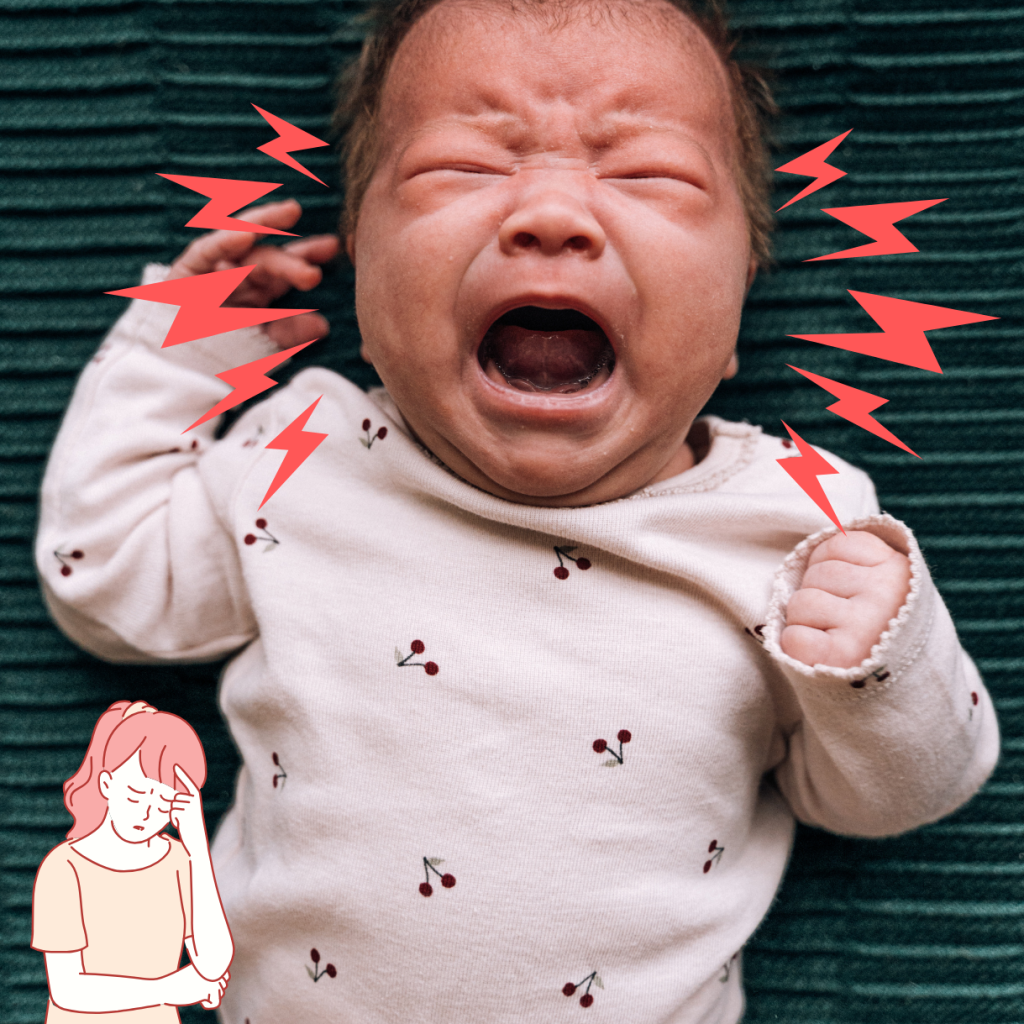In this post, we will talk about several effective tips for calming and comforting a fussy baby. There are many reasons why babies may be nervous or irritable, and crying is their way of letting us know that something is bothering them.
In addition, some babies are more anxious than others and are more agitated from birth. Discover in this article the best ways to soothe a fussy little one and help your baby calm down (and you too, mama!).

Effective Tips For Calming And Comforting A Fussy Baby
First we will talk about what could be making your baby restless.
What Could Be Making Your Baby Restless?
Crying is the way babies let us know that something is bothering them since they cannot communicate it to us in any other way.
The baby’s character, the time of day, or some illnesses that are common in babies may be some of the reasons why your little one seems so restless.
Here are some guidelines to help you check what may be affecting your baby.
Review the Most Basics
Make sure you have everything you need to make your baby calm and safe. Get their favorite pacifiers, toys, and a blanket ready at hand.
A cozy warm environment is essential for baby’s comfort, thus, consider soft baby blankets from Cozy Panda that will provide the perfect soothing touch.
Here are some reasons why your little one may feel unwell:

*Diaper change. A dirty or very wet diaper can bother your baby and prevent them from stressful falling asleep.
*Hunger. In addition to crying, babies often express it by putting their fists in their mouths or smacking their lips.
*Poor digestion. If they have swallowed a lot of air or eaten too much, the baby’s tummy may hurt. A tummy massage will help soothe it.
*Sleep. Sometimes, your baby wants to fall asleep but can’t and becomes agitated. An unexpected noise or other shock may have disturbed them. Picking them up and rocking them may help.
Noise around a baby may disturb them. A continuous, monotonous sound can help your little baby sleep, as it reminds them of the sensations they experienced inside the mother’s womb.
On the other hand, loud voices or noises tend to disturb a baby and prevent them from falling asleep.
Uncomfortable clothing. Just like with adults, clothing that is too tight, hot, or wrinkled prevents children from feeling comfortable and being able to relax.

Your Emotional State also Influences It
Babies need to feel our support and protection in a calm manner. When we are irritated or very tired, they also become more nervous and show it by crying.
Just as we are more fatigued at the end of the day, some babies also become more irritable and nervous in the evening.
Caring for a baby is physically and mentally tiring, and we also need to rest and take some time to recover and feel better.
Rule Out Mild Disorders Typical of Babies
There are several mild disorders typical of the first weeks and months of life that cause restlessness and prevent the baby from relaxing. These are the most common:
*Colic. This is very common at these early ages, and the exact cause is often unknown. Infant colic usually starts suddenly at nightfall, and the crying can last for several hours.
You can try holding your baby wrapped in a blanket, rocking them, or walking them around the house.
Try to stay calm, and if you have any doubts or, especially if the baby has a fever, vomiting, or diarrhea, call your doctor.
Colic disappears around twelve weeks of age. If it continues after that time, you should also consult your doctor.
*Gas. Gas in the stomach and, especially, intestinal gas are very bothersome for babies. The position when breastfeeding or taking a bottle can cause them to swallow more air.
It is also important to empty one breast well before moving on to the other, as the latter milk is richer and more soothing.
Try giving them a massage on their abdomen or holding them so that your hand is on their tummy as a support.
*Gastroenteritis. Diarrhea is not a determining symptom in such young babies because their stools are soft.
If other symptoms, such as vomiting or cramps, appear, consult your doctor for instructions on the steps to follow.

How to Soothe a Nervous Baby?
There is no magic formula for calming a baby, and what works for one may not necessarily work for another.
Here are a few ideas that often work to calm nervous and irritable babies:
*Give your baby a massage. Massages calm and strengthen the immune system.
*Rock them gently to make them feel more secure and protected.
*Wear them in a baby sling. I used to love wearing my new baby! He would cry ALLLLLLL the time and if I wasn’t holding him?
Ya, he would scream! I went to so many doctors but it was never ever figured out. The only thing my baby loved was to be in my arms and next to my heart. So, I carried him in a baby sling! It was truly a lifesaver!
*Sing or whisper to your little one. Your voice will calm them.
*Play soft, relaxing music. Listening to it generates endorphins that increase the feeling of well-being.
*Relax the atmosphere. Soft lighting and subtle colors and aromas help create a calm atmosphere.
*Make sucking easier for them. Breastfeeding, bottle feeding, or a pacifier soothes and comforts them.
*Smile and play with your baby. Sometimes, giving them all of your attention is enough.

Why Is It Important for You to Take a Break from Crying?
A baby crying for hours is physically and mentally exhausting. When, after trying various options, nothing works, it is best to take a break after leaving the baby in its crib in a completely safe place.
Take a deep breath and relax. Staying calm is good for you and your baby. You can listen to some music, read a book, or do a simple task.
After ten or fifteen minutes, go into the baby’s room. If he or she is still crying, try to calm him down again.
Babies express what is happening to them through crying, as they cannot do so in any other way. It is important to remain calm and have a lot of patience with nervous babies, transmitting to them all our support and protection.
Navigating the cries of a nervous or irritable baby requires patience, understanding, and a variety of soothing techniques.
By ensuring your baby’s basic needs are met and creating a calming environment, you can significantly ease their discomfort.
Remember, each baby is unique, and finding what works best for your little one might take some experimentation.
Above all, it’s essential for caregivers to also take moments for themselves, regaining energy and composure, to maintain a nurturing presence.
I hope my Effective Tips For Calming And Comforting A Fussy Baby have helped you in some way! I KNOW how hard it can be!!!
Stay persistent and gentle—it’s through these loving interactions that both you and your baby will find relief and peace… promise!!!
PIN IT!
